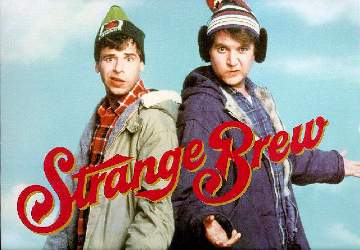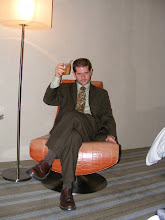Say WHAT?!

5/12/06
Do you know what "speaking statements" are? I didn't either, until yesterday. Turns out, they're a very powerful and rather fucked up way for the Executive Branch of the government to corn-hole Congress. Here's the skinny: After a president has signed a Congressional bill into law he has an opportunity to make a speaking statement, which is a presidential release effectively stating which parts of the bill he just signed the judiciary should concentrate on and what to completely ignore. They are final, unilateral and unable to be challenged by Congress. It's sort of like if your mom asked you what punishment you thought you deserved, and then when you suggested something, she pretended like she hadn't heard you and just punched you in the face.
Speaking statements didn't really come into their own until the Reagan Administration. President Reagan released 71 of these beauties, Bush Sr. 232, Clinton 140, and Junior has executed a bone-shattering over 750 speaking statements, almost double what took the last 3 presidents over twenty years to rack-up.
The real power of the S.S. (nice initials, eh?) is that sometimes it can act like a line-item veto. It's usually employed to protect some power of the presidency the Executive Branch feels is being encroached upon. By now we are all painfully aware that President Bush sort of views his office like some kind of private fiefdom in which he can do whatever he wants and acts shocked and almost pissed off whenever anyone suggests that maybe, just perhaps, he's stark raving drunk with power. Here's a little breakdown of the most interesting S.S.'s this administration has released:
1. Torture Ban for the "War on Terror" detainees. After signing this bill, the POTUS released a S.S. stating that he can ignore the platitude that we shouldn't torture people if he feels its a case of national security. Or whenever he's feeling froggy. Basically this renders the law moot and about as meaningful as an Adam Sandler movie.
2. Congressional Oversight Committees have the right to investigate or ask for info from the Executive Branch concerning the recent questionable wartime efforts such as the execution of the Patriot Act, or investigating Domestic Wire Taps. With his S.S., Bush effectively said, "I'll tell you what I want, when I want, if I decide to tell you anything at all, which I won't."
3. Inspector General in Iraq. Set up by Congress after the Abu Gharib debacle, he has ultimate power to investigate anything concerning procedures in Iraq. This instatement stated that no official could refuse or block a subpoena from the IG. Dubya, after approving the law, said the IG couldnt tell Congress anything without his say-so, and that the IG couldnt investigate anything the Pentagon wants to investigate themselves, rendering his ultimate, incorruptible power as impotent as a wet noodle.
 In most cases Congress, let alone the press and public, don't even know a S.S. has been released. The S.S. is a tricky and shadowy mistress employed to castrate a law which the president could not possibly veto because it would be political suicide, such as the ban on torture. Now they can still torture people if they want, because the President released a S.S. saying it was technically still legal if he says so. Fucked up, huh? Speaking statements are a matter of public record, but you have to be pretty savvy and possess a gargantuan tolerance for boredom to find and weed through the documents, naturally written in vague, convoluted legalese. Wanna check some out? Here's an excerpt:
In most cases Congress, let alone the press and public, don't even know a S.S. has been released. The S.S. is a tricky and shadowy mistress employed to castrate a law which the president could not possibly veto because it would be political suicide, such as the ban on torture. Now they can still torture people if they want, because the President released a S.S. saying it was technically still legal if he says so. Fucked up, huh? Speaking statements are a matter of public record, but you have to be pretty savvy and possess a gargantuan tolerance for boredom to find and weed through the documents, naturally written in vague, convoluted legalese. Wanna check some out? Here's an excerpt:Pages 191 229
Week Ending Friday, February 10, 2006
Statement on Signing the Deficit Reduction Act of 2005
February 8, 2006
Today, I have signed into law S. 1932, the ``Deficit Reduction Act
of 2005.'' The Act reduces unnecessary spending of taxpayer dollars,
reflecting a commitment to fiscal responsibility.
The executive branch shall construe section 1936(d)(2) of the Social
Security Act as enacted by section 6034 of the Act, which purports to
make consultation with a legislative agent a precondition to execution
of the law, to call for but not mandate such consultation, as is
consistent with the Constitution's provisions concerning the separate
powers of the Congress to legislate and the President to execute the
laws. Sections 5006(b) and 5008(c) of the Act, and section 401A(a)(2)(C)
of the Higher Education Act of 1965 as enacted by section 8003 of the
Act, call for executive branch officials to submit legislative
recommendations
[[Page 216]]
to the Congress. The executive branch shall construe such provisions in
a manner consistent with the constitutional authority of the President
to supervise the unitary executive branch and to recommend for
congressional consideration such measures as the President shall judge
necessary and expedient. George W. Bush
The White House,
February 8, 2006.
Still conscious? The highlighted sections are the real meat n' potatoes of the document; they say, basically,
"We'll obey it if it's convenient and doesn't conflict with all the heinous shit we have planned but dont want the public to know about. Seriously, it's some fucked up stuff...butt stuff. It's gonna be totally awesome. We are above the law."
Why even have a Legislative or Judiciary Branch if you aren't accountable to either? Bush and Cheney don't seem to find them vital components to the running of the country. The irony is that the signing statements are designed to protect constitutional powers and rights, and yet I'm almost positive there was something in that document about separation of power. Something about Checks and...Barnicles? I forget, but I'm sure the drafters didn't want the president to have unlimited supremacy. Bush has seen the first 3 Star Wars movies waaaaay too many times.
 Given this information, it's starting to become obvious why Bush is the only president in modern history to have not vetoed a single bill; he doesn't have to, he merely kills the sections he doesn't like. Canada's looking mighty good right about now. If only it weren't so goddamn cold and, you know, filled up with Canadians.
Given this information, it's starting to become obvious why Bush is the only president in modern history to have not vetoed a single bill; he doesn't have to, he merely kills the sections he doesn't like. Canada's looking mighty good right about now. If only it weren't so goddamn cold and, you know, filled up with Canadians.For a look at the fantastically remarkable reporting that first brought this story to the fore, check out Charlie Savage, (link below) Legal Affairs Correspondent at The Boston Globe.
View Presidential Documents
Savages Original Story


0 Comments:
Post a Comment
<< Home